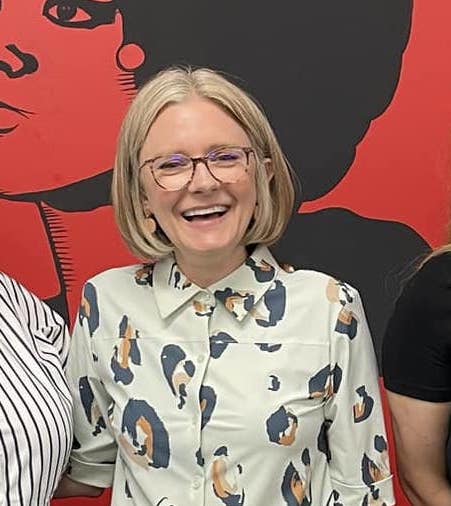
Carrie Leach
Research Assistant Professor, Institute of Gerontology; Co-Director of Community Engagement, CURES; Associate Center Director of Community Inclusion, CHECK-UP; Adjunct Professor, Department of Public Health
Carrie Leach
Bio Sketch
Carrie Leach, PhD, MPA is a Research Assistant Professor at the Institute of Gerontology, Co-Director of Community Engagement at the Center for Urban Responses to Environmental Stressors (CURES), and Associate Center Director for Community Inclusion at the Center for Health Equity and Community Knowledge in Urban Populations (CHECK-UP) at Wayne State University. Dr. Leach has expertise in aging and health communication, communication disparities, community-engaged research, and community-based and aging services delivery and communication.
Community Engagement, Center for Urban Responses to Environmental Stressors (CURES)
Center for Health Equity and Community Knowledge in Urban Populations (CHECK-UP)
Communicating and Disseminating Science
Research Project Title
Bridging the Divide: Fostering Partnerships for Urban African-American Aging ResearchResearch Project Link
https://www.pcori.org/research-results/2022/bridging-divide-fostering-partnerships-urban-african-american-aging-researchProjects
Communication & Technology Resources
Bridging the Divide: Fostering Partnerships for Urban African-American Aging Research
Professional Associations
Gerontological Society of America
National Communication Association
American Public Health Association
American Society on Aging
Michigan Public Health Association
Publications
Indicates community expert co-author
Thompson, H., Kinney, T., Leach, C., Sass, A., Washington, A., Dailey, R., Towner, E., Beavers, A., Sneed, R., Solomon Edwards, K., Opara, I., Hampton, A., Cichon, Z., Rinky, A., & Khaldun, J. (2025). Use of rapid qualitative analysis (RQA) to support collaborative synergy within a community coalition for health equity in Detroit. Health Equity, 9(1), 87–99. https://doi.org/10.1089/heq.2024.0160
Leach, C. & Jankowski, T. (2024). Older adults as key assets in a community-based participatory needs assessment: How partnering with older people improves local aging policy and practice. Gerontology & Geriatric Medicine, 10, 1–9. https://doi.org/10.1177/23337214241234237 PMCID: PMC10949539
Leach, C., Novak, J., Jankowski, T., Pierce, S. & Lapan, P. (2023). An exploration of the communication dynamics of the hard-to-reach: Considering disintegration of a communication infrastructure in old age. International Journal of Communication, 17, 5781–5801. https://ijoc.org/index.php/ijoc/article/view/21006/4323
Leach, C., Schulz, A. J., Schroeck, N., Lawrence, S., Sand, S., Williams, G., Bewaji, O. A., & Fuchs-Young, R. (2023). Multi-directional communication between decision makers and environmental health researchers: A qualitative inquiry. Environmental Hazards: Human & Policy Dimensions, 23(3), 225–240. https://doi.org/10.1080/17477891.2023.2256727 PMCID: PMC11177721
Leach, C. (2023). In their own words: Dynamics that contribute to successful and sustained partnerships in CBPR with older people. Innovation in Aging, 7(Suppl1):85–86. [Abstract] https://doi.org/10.1093/geroni/igad104.0276
Leach, C., Schroeck, N., Blessman, J., Rorai, V., Cooper-Sargent, M., Lichtenberg, P. & Trentacosta, C. (2022). Engaged communication of environmental health science: Processes and outcomes of urban academic-community partnerships. Applied Environmental Education & Communication, 21, 7-22. https://doi.org/10.1080/1533015X.2021.1930609 PMCID: PMC9037758